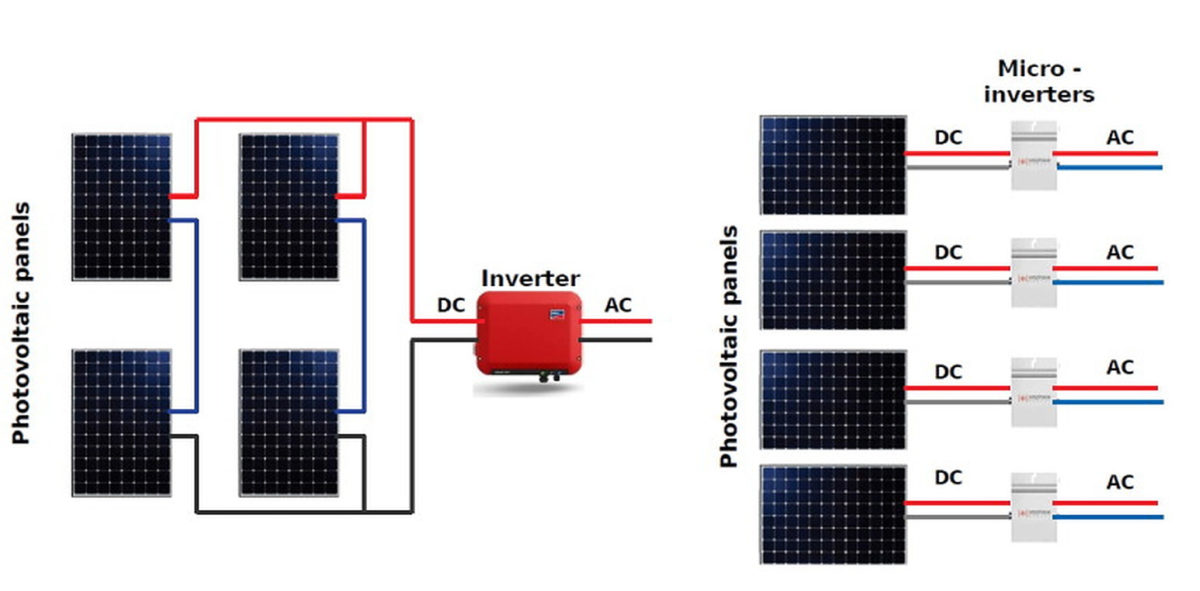From pv magazine Global
A group of researchers from the University of Limoges has compared the performance ratio (PR) of PV systems equipped with micro-inverters to that of installations relying on central or string inverters at several locations across France. Surprisingly, the study finds that micro-inverters do not perform better.
The PR is a parameter that defines the relationship between the actual and expected power production of a PV system, and is largely unrelated to an installation’s location or orientation. This value is used to understand how efficiently the PV system is operating.
The researchers initially analysed all advantages and disadvantages of an installation with micro-inverters or central/string inverters, and said that micro-inverters should offer an advantage on many points, including price. “We must also consider the lifespans of this equipment, which is a little less than 10 years for a central inverter and can reach 30 years for a micro-inverter,” they further explained. “Micro-inverters also appear to be better suited to reducing the impact of losses that can occur in solar panels whether due to shading or panel malfunction.”
These assumptions were evaluated by analysing 200 PV installations located in France. The work considered their actual production of solar energy, as well as the orientation, the inclination, the peak power, the geographical area, and other factors. “In order to carry out a statistical study on the PR, 200 data sets were recovered: 100 for installations with Enphase M210, M215, M250 and IQ7 microinverters and 100 with installations using SMA SunnyBoy 3000, SunnyBoy 5000 inverters and Sunny Tripower STP 8000,” the academics explained. “Of the 100 systems, 50 are SunnyBoy 3000 (input power 3.2 kW), 25 are SunnyBoy 5000 (input power 5.2 kW) and 25 are Sunny Tripower STP 8000 (input power 8, 2 kW).”
The average capacity of the installations relying on micro-inverters was 3.8 kW and that of the second category was 5 kW.
The analysis showed that micro-inverters are more sensitive to environmental factors. Furthermore, the scientists found that the size of a PV system doesn’t have an influence on the performance of either micro-inverters or inverters.
“According to the production data, the performance ratio is ultimately almost identical for installations with inverters or micro-inverters,” the French group emphasised. “The PR is around 79% for both the average facility equipped with micro-inverters and the average for other facilities.” It also reported slight growth in the PR with lower irradiance for both micro-inverter and central/string devices, which could depend on the inclination and orientation of the panels or the geographical area.
“Finally, the results show a homogeneity of the performance ratio between the two technologies despite different operations,” the academics concluded. “However, even if the performance ratio is identical between inverters and micro-inverters, micro-inverters are still to be favored because of their lifespans and their prices.” They go on to explain that microinverters may not be replaced for an entire 25 year module lifetime, and that they allow stakeholders to better guarantee the safety of the installation even in the event of fire.
Their findings were presented in the paper Performance ratio of photovoltaic installations in France Comparison between inverters and micro-inverters, which was recently published in the Journal of King Saud University – Engineering Sciences.
This content is protected by copyright and may not be reused. If you want to cooperate with us and would like to reuse some of our content, please contact: editors@pv-magazine.com.









By submitting this form you agree to pv magazine using your data for the purposes of publishing your comment.
Your personal data will only be disclosed or otherwise transmitted to third parties for the purposes of spam filtering or if this is necessary for technical maintenance of the website. Any other transfer to third parties will not take place unless this is justified on the basis of applicable data protection regulations or if pv magazine is legally obliged to do so.
You may revoke this consent at any time with effect for the future, in which case your personal data will be deleted immediately. Otherwise, your data will be deleted if pv magazine has processed your request or the purpose of data storage is fulfilled.
Further information on data privacy can be found in our Data Protection Policy.